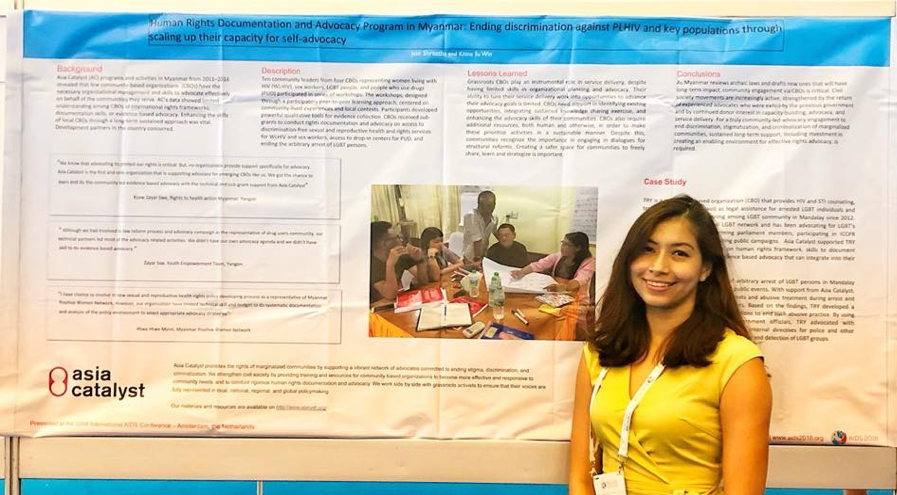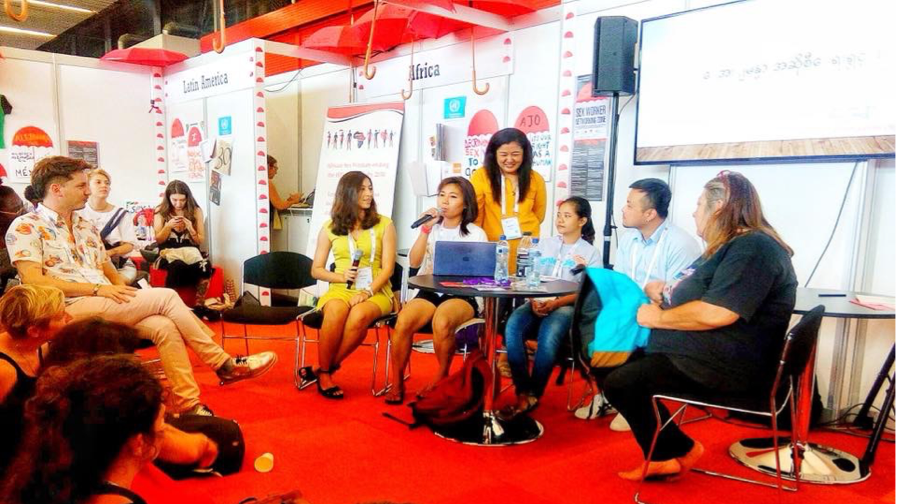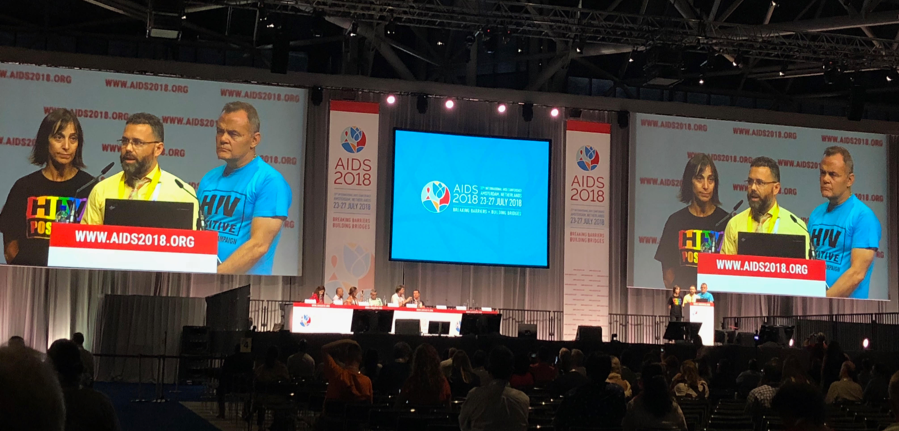
The 22nd International AIDS conference was organized from 23-27 July 2018 in Amsterdam, the Netherlands. I was awarded a partial scholarship to present my work in a poster presentation, ‘Human Rights Documentation and Advocacy Program in Myanmar: Ending discrimination against PLHIV and key populations through scaling up their capacity for self-advocacy.”
I also had the chance to interpret for Aye Myanmar Association (AMA), one of our partners in Myanmar, so they could participate in the Global Network of Sex Work Projects’ pre-conference meeting and present on their legal project for sex workers in the conference’s community space, the “Global Village” (GV). I consider promoting the participation of grassroots groups to be an essential part of my work and I also learned a lot. At the pre-meeting, sex workers activists strategized on how best to use the conference for effective advocacy. They spent time identifying their key issues, preparing advocacy messages, discussing at which sessions sex workers could acquire important new knowledge, and determining protest routes where they would be most visible to key policy makers.
As this was my first time attending a global AIDS conference, I was interested to participate in as many sessions and events as I could. I was impressed by the conference’s attention to the inclusion of diverse participants, including participants with disabilities. For example, plenary sessions were simultaneously presented in sign language. Rooms were easily wheelchair accessible. Volunteers were everywhere to provide directions if you got lost. There was always a variety of presentations and events to choose from at any given time, from Global Village activities to actions and formal presentations. People who did not register for the conference could still access the Global Village and networking zones for free, where community networks, INGOs, and NGOs opened booths and created a safe space to discuss relevant in-country community issues such as violent policing practices towards female and transgender sex workers, legal and paralegal services for sex workers, and the health impact of punitive laws. I particularly liked that the GV and networking zone were used for cross-country learning on challenges and effective approaches to ensuring enabling environments for key populations.

I was impressed that freedom of expression was fully respected and that protests and actions were allowed even when interrupting sessions. Communities made use of all spaces as advocacy channels to raise their voice directly towards politicians and policymakers in attendance. For example, sex workers activists disrupted a meeting of Parliamentarians leading the flight against AIDS, including representatives from US Congress, UK, and the Netherlands, to demand decriminalization and a recognition of the rights of sex workers in order to successfully combat the HIV epidemic. Sex worker activists called on the US congresswoman to move forward on decriminalization of sex work in different states. She committed to work together with sex workers to remove punitive laws for sex work in United States.

I work on human rights and advocacy in Myanmar, so I mainly attended sessions about law and policy reform, criminalization and discrimination, and community engagement and advocacy. There is a gross lack of data, including in my region, and just a few examples of progressive policy reform with true community participation. I wanted to hear how others, in the face of shrinking civil society space and restricted funding, are overcoming these barriers to support an effective HIV response.
After six days at IAC, I realized that, in many countries, political commitment and accountability among stakeholders is still limited compared with what is needed for a truly sustainable, multi-sectoral, integrated HIV response. Safe space for community engagement is too often restricted and threatened by the powers that be.
In Myanmar, communities are involved in the process of reforming some our punitive laws and policies towards more rights- based ones that reflect their needs, and I am proud that Asia Catalyst is supporting them to do that. I am also gratified to have joined the global activist community in Amsterdam to learn lessons from countries with effective policies and laws and effective community participation, as we work towards those same goals here at home.




